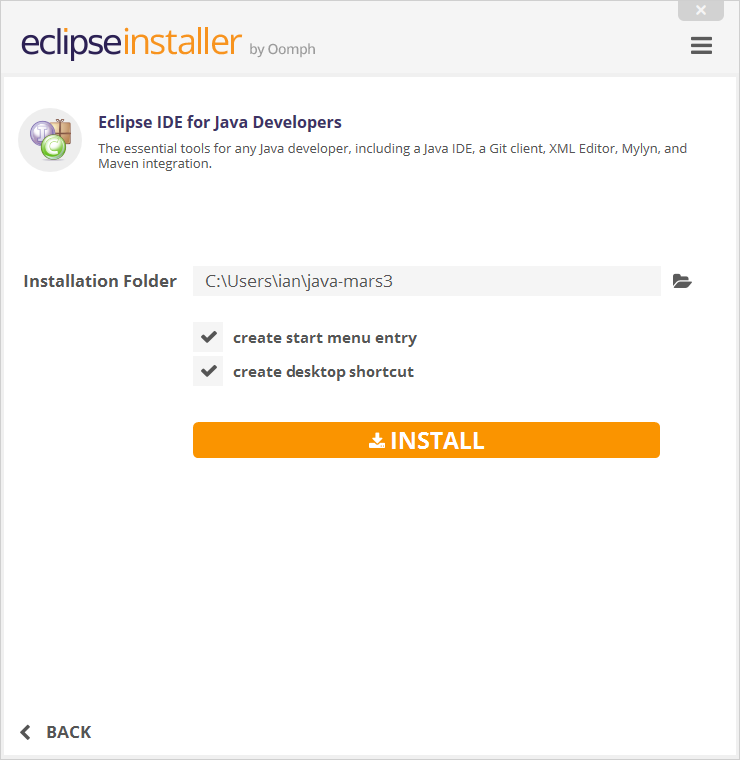Here’s a handy reference on where to get Eclipse for the Mac. Version 3.7 (“Indigo”) installs nicely in Lion and seems to work okay, but our household hasn’t put it to a grueling acid test. Eclipse GlassFish provides a complete application server which serves as a compatible implementation for the Jakarta EE specification. Eclipse Jetty provides a web server and javax.servlet container. Eclipse Jetty provides a web server and javax.servlet container. Eclipse Equinox is an implementation of the OSGi core framework specification.
Eclipse Modeling Tools. 175,795 DOWNLOADS. This package contains framework and tools to leverage models: an Ecore graphical modeler (class-like diagram), Java code generation utility for RCP applications and the EMF Framework, model comparison support, support for XSD schemas, OCL and graphical modeler runtimes. Eclipse Modeling Tools. 175,795 DOWNLOADS. This package contains framework and tools to leverage models: an Ecore graphical modeler (class-like diagram), Java code generation utility for RCP applications and the EMF Framework, model comparison support, support for XSD schemas, OCL and graphical modeler runtimes. Free download Eclipse Indigo Eclipse Indigo for Mac OS X. Eclipse Indigo - Highlights of the Indigo release include important new functionality for Java developers, innovations in modeling technology, and advancements in Eclipse runtime technology.

Eclipse IDE for Java EE Developers
- 213 MB
- 4,267,399 DOWNLOADS
Tools for Java developers creating Java EE and Web applications, including a Java IDE, tools for Java EE, JPA, JSF, Mylyn and others.
macOS 32-bitx86_64
Linux x86_64
Eclipse Classic 3.7.2
- 175 MB
- 3,222,297 DOWNLOADS
The classic Eclipse download: the Eclipse Platform, Java Development Tools, and Plug-in Development Environment, including source and both user and programmer documentation. Please look also at the Eclipse Project download page.
macOS 32-bitx86_64
Linux x86_64
Eclipse IDE for Java Developers
- 129 MB
- 1,615,255 DOWNLOADS
The essential tools for any Java developer, including a Java IDE, a CVS client, XML Editor, Mylyn, Maven integration and WindowBuilder
macOS 32-bitx86_64
Linux x86_64
Eclipse IDE for C/C++ Developers (includes Incubating components)
- 109 MB
- 626,821 DOWNLOADS
An IDE for C/C++ developers with Mylyn integration. Note that this package includes some incubating components, as indicated by features with '(Incubation)' following their name.
macOS 32-bitx86_64
Linux x86_64
Eclipse Indigo Download For Android
Eclipse Modeling Tools
- 272 MB
- 175,795 DOWNLOADS
This package contains framework and tools to leverage models : an Ecore graphical modeler (class-like diagram), Java code generation utility for RCP applications and the EMF Framework, model comparison support, support for XSD schemas, OCL and graphical modeler runtimes. It includes a complete SDK, developer tools and source code.
macOS 32-bitx86_64
Linux x86_64
Eclipse IDE for JavaScript Web Developers
- 111 MB
- 172,162 DOWNLOADS
Tools for JavaScript developers creating Web applications, including a JavaScript IDE, tools for JavaScript, HTML, CSS, and XML.
macOS 32-bitx86_64
Linux x86_64
Eclipse IDE for Java and Report Developers
- 243 MB
- 135,214 DOWNLOADS
Java EE tools and BIRT reporting tool for Java developers to create Java EE and Web applications that also have reporting needs.
macOS 32-bitx86_64
Linux x86_64
Eclipse for RCP and RAP Developers
- 182 MB
- 130,142 DOWNLOADS

A complete set of tools for developers who want to create Eclipse plug-ins, Rich Client or Rich Ajax Applications (RCP+RAP), plus Mylyn, and an XML editor. In addition to the CVS Eclipse Team provider, it also contains the EGit tooling for accessing Git version control systems.
macOS 32-bitx86_64
Linux x86_64
Eclipse for Testers
- 91 MB
- 81,033 DOWNLOADS
This package contains Eclipse features that support the software development quality assurance process, such as the Jubula test specification client and Mylyn.
Eclipse Indigo Download Mac Version
macOS 32-bitx86_64
Linux x86_64
Eclipse IDE for Parallel Application Developers (includes Incubating components)
- 182 MB
- 64,815 DOWNLOADS
Eclipse Indigo Download Mac
An IDE for Parallel Application Developers. Includes the C/C++ IDE, plus tools for Fortran, UPC, MPI, a parallel debugger, etc. Note that this package includes some incubating components, as indicated by features with '(Incubation)' following their name.
macOS 32-bitx86_64
Linux x86_64
Eclipse for Scout Developers
- 176 MB
- 61,372 DOWNLOADS
Developing Scout applications is supported by this Scout Developers Package.
macOS 32-bitx86_64
Linux x86_64
Eclipse IDE for C/C++ Linux Developers (includes Incubating components)
- 144 MB
- 45,491 DOWNLOADS
This package augments the C/C++ package specifically for Linux developers. It includes GNU Autotools integration with the CDT and plugins to interact with native Linux tools such as GCov, GProf, OProfile, and Valgrind. Visualization and analysis plugins for Linux tracing tools LTTng and SystemTap are also present. For Linux distribution packagers, an RPM .spec editor with rpmlint integration is available. Note that this package includes some incubating components, as indicated by features with '(Incubation)' following their name.
I decided to install the latest version of Eclipse, Indigo, and configure it to do Android application development. My specific final target is to build the VLC Player for Android. Below are my notes for installing such an Eclipse configuration for Android development on a clean Mac OS X Snow Leopard system.
Note: These instructions also work for the latest Eclipse Juno version. Just replace references to Indigo with Juno.
Install Android SDK
- Download latest Android SDK (I downloaded “android-sdk_r12-mac_x86.zip”).
- Unzip and move the extracted “android-sdk-mac_x86” directory to “/Applications”, so you end up with “/Applications/android-sdk-mac_x86”.
- Add the following to the end of your bash environment configuration file “~/.profile”. (The tilde symbol ~ translates into your home directory “/Users/your_username”.)exportJAVA_HOME=/System/Library/Frameworks/JavaVM.framework/Home
exportANDROID_SDK=/Applications/android-sdk-mac_x86
exportPATH=$PATH:$ANDROID_SDK/tools:$ANDROID_SDK/platform-tools
exportNO_NEON=1Some details on the above:
- Mac OS X Snow Leopard comes with the 64bit version of Java 1.6 installed by default. We are just setting the JAVA_HOME to point at it.
- The PATH is optional but will make it easy for you to run the Android SDK Manager by typing “android” or the Android Debug Bridge by typing “adb” in the Terminal.
- Set NO_NEON to prevent Android compilation from using the Neon CPU enhancements which are not supported on all Android devices (including the Emulator).
- Run the Android SDK Manager, by launching $ANDROID_SDK/tools/android, to install support for one or more Android OS platform versions. (It is mandatory that you install at least one OS platform version.)
- Click on “Installed packages” to see what is installed by default, usually just the Android SDK Tool and Platform-tools.
- Click on “Available packages”, expand “Android Repository”, and select the SDK Platform OS version that you want to develop for. For example, if you wish to do Honeycomb development (or your Android phone has Honeycomb), you can check “SDK Platform Android 3.0, API 11, revision 3”. You might wish to also get the samples by checking “Samples for SDK API 11, revision 1”.
Optionally, while we have the Android SDK Manager opened, you can create an emulator by clicking on “Virtual devices”:
- Click the “New…” button, name your emulator, select a platform OS version for the target, input a SD Card size like 32 or more, and hit the “Create AVD” button. The SD Card size is optional but some programs may fail to run if a SD Card is not present.
- Periodically, to update your installation, you may wish to go to “Installed packages” and click the “Update All…” button. This will return all updates (even for items not installed) which are applicable; you will need to select Reject for those items which you don’t want to install/update.
Install Android NDK
We will need the Android Native Development Kit (NDK) in order to compile the Android VLC JNI library:
- Download the latest Android NDK (I downloaded “android-ndk-r6-darwin-x86.tar.bz2”).
- Unzip and move the extracted “android-ndk-r6” directory to “/Applications”, so you end up with “/Applications/android-ndk-r6”.
- Edit “~/.profile” to add the following:exportANDROID_NDK=/Applications/android-ndk-r5b
exportPATH=$PATH:$ANDROID_NDK:$ANDROID_NDK/toolchains/arm-linux-androideabi-4.4.3/prebuilt/darwin-x86/binThe PATH is optional but will make it easy for you to run “ndk-build” from a Terminal. Also, when compiling projects like VLC, the android prebuilt tool will be required to be in the path.
Install Eclipse
- Download the latest Eclipse.
- Select “Mac OS X (Cocoa)” in the “Packages for” drop-down listbox at the top to filter for only Mac versions.
- Find the Eclipse flavor you want. If you aren’t sure, I recommend getting “Eclipse IDE for Java Developers”. Click on the “Mac OS X 64 Bit” to the right to download. (I downloaded “eclipse-java-indigo-macosx-cocoa-x86_64.tar.gz”.)
- Unzip and copy the extracted “eclipse” directory to “/Applications”, so you will end up with “/Applications/eclipse”.
- Start Eclipse and select your workspace location. (If you select an old location which was used by an older version of Eclipse, make sure to delete the “.metadata” sub-directory there first; otherwise, your new Eclipse will display old plug-ins and IDE modes which it may not have installed.)

Change How Eclipse Handles Search Results
In the recent versions of Eclipse, the default behavior for search is to reuse the editor. This default behavior can be annoying because it prevents you from being able to simultaneously view more than one search result. Opening a new search result would reuse the editor tab and cause the previous search result to become unavailable. To configure Eclipse to open each search result in a new editor tab, do the following:
- Go to menu “Eclipse->Preferences->General->Search”.
- Uncheck the “Reuse editors to show matches” option.
Eclipse Indigo Download Free
Install Android Eclipse Plugin (ADT)
Add the ADT to Eclipse:
- Run Eclipse.
- Select Help->Install New Software…
- Input “https://dl-ssl.google.com/android/eclipse/” into the “Work with:” field. Hit Enter. The table below should populate automatically. (You can use the optional Add button if you want to bookmark this URL.)
- In the table, expand “Developer Tools” to see what it contains.
- Check the “Developer Tools” box to select all. (If you want just the minimum, check only “Android Development Tools”.)
- Click Next, Next, select “I accept the terms of the license agreements” radio button, and click Finish.
- If the Security Warning dialog about the “unsigned content” appears, click Ok to accept.
- Click on “Restart Now” to restart Eclipse.
Configure the ADT:
- Under Eclipse, go to menu Eclipse->Preferences.
- Select Android.
- In the “SDK Location”, browse to your android install directory (directory pointed at by $ANDROID_SDK or “/Applications/android-sdk-mac_x86”).
- Hit Apply and you should see the Android platform versions you installed earlier populate the table.
- Hit Ok to close the dialog.
Install Eclipse IDEs for PHP and Javascript
Optionally, add the Javascript Development Tool (JDT):
- Go to Eclipse menu Help->Install New Software…
- Click on the dropdown arrow for the “Work with:” box and select “Indigo – http://download.eclipse.org/releases/indigo”. (If you don’t see this entry, just type in the URL manually.) The table will populate with a bunch of Indigo-compatible plugins.
- Type “javascript” into the “type filter text” field to show only the Javascript related plugins.
- Check the “JavaScript Development Tools” (for example, under “Programming Languages”) and click Next, Next, accept the license, Finish.
- Click on “Restart Now” to restart Eclipse.
Optionally, add the PHP Development Tool (PDT) by repeating the steps above, filtering on “PHP” instead, and selecting “PHP Development Tools” for installation.
Install Subversion Eclipse Plugin (Subclipse) and Compile Android VLC Player
If interested, see the next post for instructions on installing the Subversion Eclipse Plugin (Subclipse) and compiling the VLC Player for Android.